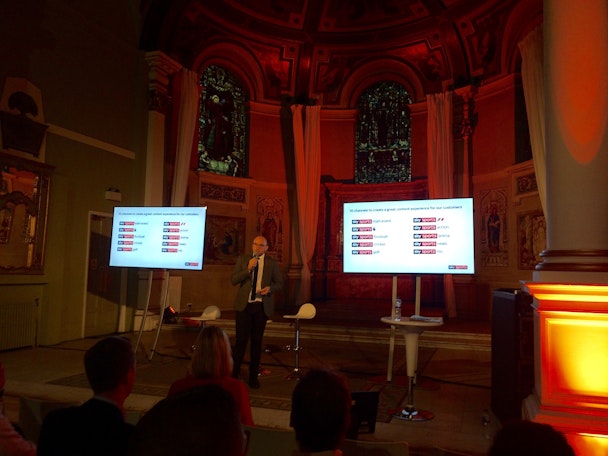Sky Sports cites Tough Mudder and Game of Thrones for decline in sport viewing - but evades threat of social
Sky Sports’ strategy head Ben Joyner has blamed scheduling clashes (including with a show its sister channel broadcasts) as well as a perceived increase in sport participation in events like Tough Mudder and Parkrun as reasons for a decline in viewership for traditional sport broadcasting.

Ben Joyner was speaking at Vizeum's inaugural One event
“We need to redefine the notion of sport in the world of entertainment,” he said at Vizeum’s inaugural One event last week. “No longer are we just competing against other sports, but we need to make sure that we create a narrative in editorial around our output so we can compete with a changing landscape.”
This changing landscape he describes is not around the rising competition Sky Sports faces from social media platforms that are winning sports rights formerly reserved for linear broadcasters. In fact, while Joyner acknowledged that there are new players entering the sports rights space, he downplayed the impact of this to the Sky Sports business.
“There have been recent examples of people making moves in the market, I couldn't predict where we are going to be in five or 10 years,” he said.
“We know the value of sports rights and we are an established business in monetising them effectively,” he added, seemingly jibing at social platforms’ ability to take full advantage of sports rights in the absence of a linear sell.
Instead, Joyner believes Sky Sports is not just competing with other sport broadcasters and online players, but with big TV entertainment franchises, as well as live sporting events.
"Our competitor set is changing. No longer is our competitor set purely other pay-TV sports broadcasters, or sport on free-to-air, or even sport on digital platforms. We are now competing with many other content brands which take away eyeballs from people consuming sport – Game of Thrones, Strictly Come Dancing, Love Island,” he said.
Joyner's mention of Game of Thrones as a Sky Sports competitor may raise eyebrows given that it is Sky Atlantic that broadcasts the show in the UK.
What’s more, Joyner believes there is an increase in the UK population following and competing in sport rather than just watching it – which is what Sky Sports’ traditional business model is built on: people buying pay-TV subscriptions with Sky to consume content.
“We know there is a bigger growing audience that follows sport ... via apps, online, social media, YouTube, streaming – whether that is legal or illegal,” he said.
“And then there is this notion of experiential. What we see is things like Parkrun and Tough Mudder, people signing up for 10ks or cycling – that is potentially taking away consumption away from traditional sport broadcasting,” he added.
It seems to be a strategy to pull attention away from the imminent threat of digital-only players to legacy businesses like Sky Sports, and onto more palatable – but minute in comparison – threats like the golden age of drama and Tough Mudder’s growing empire. For context, more than 120,000 people participated in the UK Tough Mudder events in 2016, versus the average 1.03m viewers Sky Sports pulled in for the opening eight games of the 2016/17 Premier League Season.
Viewing figures for Sky’s Premier League coverage slumped to their lowest point in seven years in the 2016/17 season with average viewing for Sky’s live TV channels falling 14% over the course of the season despite the broadcaster paying around 83% more for the most recent deal.
Against that backdrop, Amazon outbid Sky this year for the exclusive UK broadcast rights to the ATP World Tour, and the tech giant paid $50m for the rights to livestream 10 Thursday night NFL games.
Elsewhere, Facebook has acquired the exclusive rights to livestream 15 college football games in the upcoming season, and has deals to stream Major League Soccer matches, MLB games, and World Surf League events, as well as Uefa Champions League games as part of a partnership with Fox Sports.
Twitter has a partnership with the US PGA Championship, as well as more niche sports like the National Women’s Hockey League (NWHL), the National Lacrosse League (NLL), and the Canadian Football League.
YouTube partnered with BT Sport in May to broadcast the Uefa Champions League final, while Formula One has inked a highlights deal with Snapchat.
These platforms are banking on viewers moving to online mediums to watch sport, and Sky's online audience figures versus that of its linear ones prove this is a trend on the rise. While Sky’s TV audiences declined in the Premier League season, it saw a 31% increase in viewing through its Sky Go streaming services, which allows subscribers to watch on mobiles, tablets and computers.
Despite this, Joyner believes the death of linear consumption “is greatly exaggerated” in the press.
“There has been a lot of literature regarding the future of sports broadcasting,” he said. “There’s been a lot of focus on declining premier league audiences, millennials only watching short-form video while older audiences are purely focused on long-form, or that investment in the future will purely be on digital or socially-relevant brands. Some of these might be true but death of linear consumption is greatly exaggerated.”

